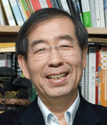 |
| |
Won Soon Park
Mayor, Seoul (Republic of Korea) |
|
 |
| |
 |
Park Won Soon was born in a village in Changnyeong, South Gyeongsang Province, South Korea, on March 26, 1956. He graduated from Kyunggi High School in 1974 and entered Seoul National University in 1975. Shortly after entering university, he was arrested for participating in a student rally against the militant dictatorship of President Park Chung Hee and imprisoned for 4 months and expelled from university. Later, he entered Dankook University and earned a bachelor’s degree in history.
Park passed the state bar examinations in 1980, and worked as a public prosecutor in the Daegu District Court in Gyeongsang Province from 1982 to 1983. Returning to Seoul from Daegu, he launched into private law practice. He worked as a human rights lawyer and defended many political activists in the 1980s and 1990s. |
|
| |
In 1991, Park traveled with his family to London and earned a diploma in international law at the London School of Economics and Political Science in the University of London in 1992. In 1993, he went to the US to take up a position as visiting research fellow in the Human Rights Program of the School of Law in Harvard University.
Back in South Korea, in 1994, Park founded the People’s Solidarity for Participatory Democracy, a non-profit, non-partisan civic organization formed with the purpose of promoting participatory democracy and securing human rights in South Korea.
In 2000, Park founded the Beautiful Foundation, with the aim of promoting a culture of philanthropy in South Korea. And in 2002, he founded the Beautiful Store, a second-hand store aiming to spread the culture of giving and sharing with others.
In 2006, Park founded the Hope Institute, a think-tank with the goal of applying policy alternatives based on the ideas of ordinary citizens.
Park was elected as Mayor of Seoul, South Korea on October 26, 2011. He was elected as an independent candidate, with the support of the Democratic Party and the Democratic Labor Party. He joined the Democratic United Party on February 23, 2012. |
|
| “Sustainability in Social Economy: Seoul Case Study” |
|
Seoul has devised and is implementing a comprehensive supporting policy to build a sustainable ecosystem, rather than the existing social enterprise development policy focusing on quantitative growth. It is promoting various policies such as enlargement of public purchase, establishment of a systematic interim support system, local development business for creation of regional ecosystem, discovery of innovative social enterprises solving social problems, and marketing support for excellent social enterprises, etc.
These various social enterprise policies consistently aim at mutual solidarity and cooperation, and building of confidence. By doing so, Seoul tries to suggest alternatives and hopes for solving all sorts of our society’s issues such as jobs and local welfare. |
| |
 |